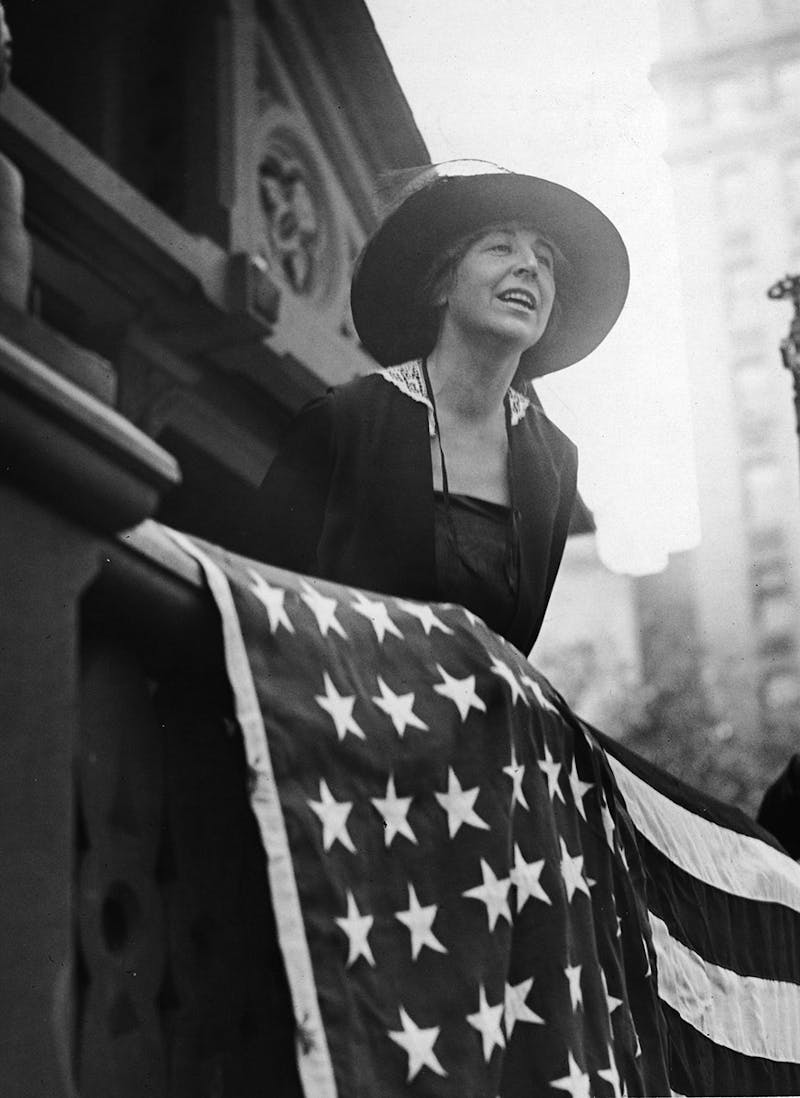
In November of 1916, Montana pacifist and suffragette Jeannette Rankin became the first woman elected to Congress, and only a few months into her term Woodrow Wilson would call for a vote that would lead the country into war with Germany. Sworn into Congress on May 2, 1917, Rankin served one term in the House, delivering a passionate outburst against entering WWI—she was one of fifty members of the house who voted in opposition—before stepping down to make an unsuccessful Senate bid two years alter.
Yet, as the founding editors of the New Republic pointed out in September of 1917, most newspapers seemed to think their female readers were interested only in recipes for jam tarts, cures for wrinkles, and instructions for “the pickling of young cucumbers.” Even Rankin, who had run on a platform of social welfare and suffrage, was depicted in most major papers as little more than a housewife and fashion plate: “The exact nuance of her hair was controversial newspaper matter for weeks after her election,” the editors lamented.
Rankin would return to Congress for one more term, in 1941, becoming the only member of Congress to vote against both World Wars. But despite her strong political beliefs, when she first took office, the press remained stubbornly focused on her household duties and fashion choices, a decision the New Republic bemoaned:
Conservative organs proclaimed in long paragraphs that she made her own hats and dresses and a certain “wonderful lemon meringue pie.”
One New York advocate of woman’s suffrage writes enthusiastically of a speech made by Miss Rankin at a gathering in her honor: “Her white chiffon dress fluttered in the breeze of her own eloquence. Her white satin cloak lay over the back of the chair, and her white satin pumps were small and dainty. She was a debutante at the coming-out party of women into the class of real people.” There is a kindly intention here, but there is also a little of the joy of the dog-owner whose Pomeranian has successfully toured the room on its hindlegs, “the marvel being not that it walks so well, but that it walks at all.” The benevolent newspaper tries to crown the success of its suffrage protégée by insisting on her entire femininity, the authentic femininity of height of heel and depth of powder.
It is for a different reason that a hostile paper writes of Miss Rankin: “Even after entering politics, she refused to forsake the old household arts, cooking and needlework.” Here it seems to be the motive of fear reassured. It is a throb of almost pathetic relief. Domestic anarchy may darken the future, but one of its harbingers can make lemon meringue pie and the cataclysm is at least postponed.
That this was the natural position to take against the first feminine interlopers, one can easily understand. It is less easy to see why it should still be so all-pervasive. Perhaps it is the crystallization of an attitude into a habit, a far more tenacious evil.
In 1920, Congress passed the Nineteenth Amendment, sparking a brief period in which at least twenty women were elected mayor of small, remote towns scattered through the American West, many on prohibition platforms. But they still received the same coverage that Rankin did several years earlier. Amy Kaukonen, for example, was elected mayor in Fairport, Ohio in 1922. The newspapers said that the trained chemist and physician had a “slim figure” and “stylish haircut.” Dressed in “feminine clothing,” she was nothing like the Amazonian feminists “the popular imagination conjures up.”
Back in 1917, when it first became clear that women were going to get the vote, the New Republic predicted that the superficial coverage of female politicians would someday disappear. Women deserved to have their “hopes and achievements as citizens of the world” chronicled in a major metropolitan newspaper. “The suffrage problem, the trade union problem, the equal pay for equal work problem, all these and others are being precipitated by the war, and they furnish material for the conducting of several pages,” they wrote. “Women will attain to the status of people, of ordinary human beings, allowed to pursue… whatever vocation they may choose; and… in that day there shall be no more Woman’s Pages, nor shall reporters worry whether a woman treads the halls of Congress in high-heeled shoes or in Groundgrippers.”